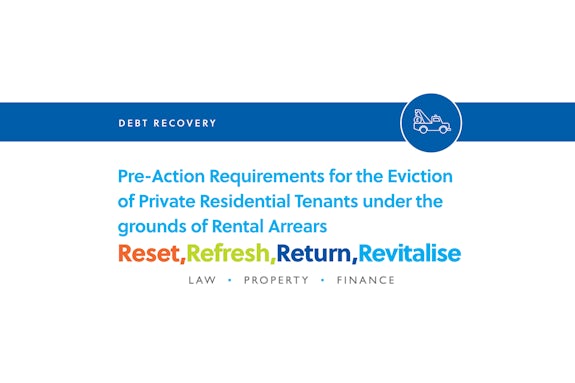By Gilson Gray
March 5, 2021

I have previously blogged about a number of changes made to Scottish Landlord and Tenant legislation introduced by the Coronavirus (Scotland) Acts during the turbulent course of 2020. Those changes included the increase of notice periods for most eviction notices and the switch from considering eviction grounds on a mandatory basis to an evaluation of reasonableness.
There are further changes afoot which Landlords must be aware of. Should landlords wish to evict their tenants on the ground of rental arrears they must now comply with a number of prescribed “Pre-Action Requirements”. Whilst the Pre-Action requirements were alluded to in the second Scottish Coronavirus Act of 2020, Scottish Ministers have now codified what is expected of Landlords through the “Rent Arrears Pre-Action Requirements (Coronavirus) (Scotland) Regulations 2020”.
The Pre-Action requirements apply to:
As can be seen the Pre-action requirements have wide coverage. It is more than likely they will cover most private landlords currently considering eviction action.
So what are the Pre-Action requirements?
Pre-action requirements:
Landlords must provide their tenant(s) with clear information relating to:
Landlords must also make reasonable efforts to agree with the tenant a reasonable plan to make payments to the landlord of:
Lastly Landlords must be able to convince the First Tier Tribunal of the following matters-
The Pre-Action requirements are expected to remain in force until at least March 2021, when the Scottish Government will review them with a view to either renewing their application or discontinuing their requirement.
Whilst most landlords or their agents would in their ordinary course fulfil a number of the prescribed requirements before raising proceedings, the Scottish Government is clearly concerned with those Landlords who may choose to ignore the plight of their unfortunate tenants before doing so. They hope that the new regulations will allow some tenancies to weather the storm of the pandemic by encouraging both parties to talk prior to either seeking legal advice.
Given their recent introduction it remains to be seen how stringently the First Tier Tribunal will put Landlords to the test. Before their introduction, no requirements existed in the private rented sector for landlords to undertake any action in conjunction with tenants to manage arrears prior to raising proceedings on the grounds of rent arrears. Many landlords I have spoken to about these changes are not overly pleased with further hurdles being put in their path on the road to repossessing their property. Many are struggling financially during these difficult times and feel that their interests are perhaps not being protected in the same vein as tenants’ rights are.
If you would like further information regarding the topics discussed in this blog, please contact:
Scott Runciman by email: srunciman@gilsongray.co.uk or by phone: 0131 516 5387
David Alexander by email: dalexander@gilsongray.co.uk or by phone: 07841 920 089 / 0131 516 5362
You can also visit our Debt Recovery Team page by clicking here.
The information and opinions contained in this blog are for information only. They are not intended to constitute advice and should not be relied upon or considered as a replacement for advice. Before acting on any of the information contained in this blog, please seek specific advice from Gilson Gray.

Scott is an Associate in our debt recovery team. He has a wealth of experience in the process of recovering debt and the enforcement of court judgements having worked with Sheriff Officers and Messengers-at-Arms early in his career. He has specialised in the field since 2016 when he qualified as a Scottish Solicitor and Notary Public.